Place-making and urban development : new challenges for contemporary planning and design / Pier Carlo Palermo and Davide Ponzini.
By: Palermo, Pier Carlo
Contributor(s): Ponzini, Davide
Material type: TextSeries: Regions and citiesPublisher: New York : Routledge, Taylor & Francis Group, 2015Description: xiv, 266 pages ; 24 cmContent type: text Media type: unmediated Carrier type: volumeISBN: 9780415709569 (hardback)Subject(s): City planning | Public spaces | Urban ecology (Sociology) | Community development | Environmental psychology | BUSINESS & ECONOMICS / General | BUSINESS & ECONOMICS / Development / Business Development | BUSINESS & ECONOMICS / Development / Sustainable DevelopmentDDC classification: 307.1/216 LOC classification: HT166 | .P327 2015Other classification: BUS000000 | BUS020000 | BUS072000 Summary: "The regeneration of critical urban areas through the redesign of public space with the intense involvement of local communities seems to be the central focus of place-making according to some widespread practices in academic and professional circles. Recently, new expertise maintains that place-making could be an innovative and potentially autonomous field, competing with more traditional disciplines like urban planning, urban design, architecture and others. This book affirms that the question of 'making better places for people' should be understood in a broader sense, as a symptom of the non-contingent limitations of the urban and spatial disciplines. It maintains that research should not be oriented only towards new technical or merely formal solutions but rather towards the profound rethinking of disciplinary paradigms. In the fields of urban planning, urban design and policy-making, the challenge of place-making provides scholars and practitioners a great opportunity for a much-needed critical review. Only the substantial reappraisal of long-standing (technical, cultural, institutional and social) premises and perspectives can truly improve place-making practices. The pressing need for place-making implies trespassing undue disciplinary boundaries and experimenting a place-based approach that can innovate and integrate planning regulations, strategic spatial visioning and urban development projects. Moreover, the place-making challenge compels urban experts and policy-makers to critically reflect upon the physical and social contexts of their interventions. In this sense, facing place-making today is a way to renew the civic and social role of urban planning and urban design"-- Provided by publisher.
TextSeries: Regions and citiesPublisher: New York : Routledge, Taylor & Francis Group, 2015Description: xiv, 266 pages ; 24 cmContent type: text Media type: unmediated Carrier type: volumeISBN: 9780415709569 (hardback)Subject(s): City planning | Public spaces | Urban ecology (Sociology) | Community development | Environmental psychology | BUSINESS & ECONOMICS / General | BUSINESS & ECONOMICS / Development / Business Development | BUSINESS & ECONOMICS / Development / Sustainable DevelopmentDDC classification: 307.1/216 LOC classification: HT166 | .P327 2015Other classification: BUS000000 | BUS020000 | BUS072000 Summary: "The regeneration of critical urban areas through the redesign of public space with the intense involvement of local communities seems to be the central focus of place-making according to some widespread practices in academic and professional circles. Recently, new expertise maintains that place-making could be an innovative and potentially autonomous field, competing with more traditional disciplines like urban planning, urban design, architecture and others. This book affirms that the question of 'making better places for people' should be understood in a broader sense, as a symptom of the non-contingent limitations of the urban and spatial disciplines. It maintains that research should not be oriented only towards new technical or merely formal solutions but rather towards the profound rethinking of disciplinary paradigms. In the fields of urban planning, urban design and policy-making, the challenge of place-making provides scholars and practitioners a great opportunity for a much-needed critical review. Only the substantial reappraisal of long-standing (technical, cultural, institutional and social) premises and perspectives can truly improve place-making practices. The pressing need for place-making implies trespassing undue disciplinary boundaries and experimenting a place-based approach that can innovate and integrate planning regulations, strategic spatial visioning and urban development projects. Moreover, the place-making challenge compels urban experts and policy-makers to critically reflect upon the physical and social contexts of their interventions. In this sense, facing place-making today is a way to renew the civic and social role of urban planning and urban design"-- Provided by publisher.
| Item type | Current location | Call number | Status | Date due | Barcode |
|---|---|---|---|---|---|
 UG Books
UG Books
|
BMS College of Architecture | 307.1216 PAL (Browse shelf) | Available | AR-UG2994 |
Browsing BMS College of Architecture Shelves Close shelf browser
"The regeneration of critical urban areas through the redesign of public space with the intense involvement of local communities seems to be the central focus of place-making according to some widespread practices in academic and professional circles. Recently, new expertise maintains that place-making could be an innovative and potentially autonomous field, competing with more traditional disciplines like urban planning, urban design, architecture and others. This book affirms that the question of 'making better places for people' should be understood in a broader sense, as a symptom of the non-contingent limitations of the urban and spatial disciplines. It maintains that research should not be oriented only towards new technical or merely formal solutions but rather towards the profound rethinking of disciplinary paradigms. In the fields of urban planning, urban design and policy-making, the challenge of place-making provides scholars and practitioners a great opportunity for a much-needed critical review. Only the substantial reappraisal of long-standing (technical, cultural, institutional and social) premises and perspectives can truly improve place-making practices. The pressing need for place-making implies trespassing undue disciplinary boundaries and experimenting a place-based approach that can innovate and integrate planning regulations, strategic spatial visioning and urban development projects. Moreover, the place-making challenge compels urban experts and policy-makers to critically reflect upon the physical and social contexts of their interventions. In this sense, facing place-making today is a way to renew the civic and social role of urban planning and urban design"-- Provided by publisher.
Includes bibliographical references (pages 211-254) and indexes.









There are no comments for this item.